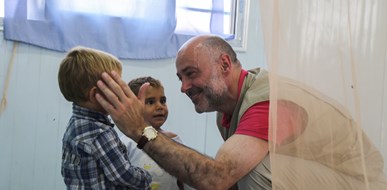[New research paper] ‘Family courts as part of states’ counter-terrorism toolkit: A welcome development for the children of FTFs?’
Published 2 December 2021
@UNICEF. A UNICEF representative visits the Al-Hol camp in northeast Syria, where 70,000 people, more than 90% of whom are women and children, rely on lifesaving assistance due to violence in the region.
In a new paper, Asser researcher and counterterrorism expert Rumyana van Ark argues that family courts may be better suited to address the cases of children of alleged foreign fighters or of children who have allegedly become foreign fighters (FTFs) – especially if the alternative is non-repatriation.
‘They made a huge and terrible mistake … if they return home there are no terrorism issues’. These comments were made in March 2015 about the British Kadiza Sultana (16), Amira Abase (15) and Shamima Begum (15) who left the UK to join IS. Kadiza Sultana has since been reported to have died in an airstrike on Raqqa, the whereabouts of Amira Abase are still unknown and as of 19 February 2019 Shamima Begum is no longer a British citizen.
Life choices
According to Asser researcher Rumyana van Ark, the furore surrounding the life choices of these girls tends to obscure a particularly important issue – in 2015, all three girls were children in the eyes of international and domestic law. As such, had one or all three of them sought a managed return to the United Kingdom before the age of 18, it would have been for a family court to decide on what measure(s) need to be applied in their particular circumstances.
In her paper ‘Family courts as part of states’ counter-terrorism toolkit: A welcome development for the children of FTFs?’ Van Ark argues that in the particular circumstances of children of alleged foreign fighters or children who have allegedly become foreign fighters, the family courts may be better suited in addressing the issues of these children of FTFs – especially if the alternative is non-repatriation.
Instead of viewing these children through a national security lens only, the author argues that the position of these children as vulnerable individuals who are more likely to suffer various harms has to be at the forefront. This is where the domestic family courts rather than the security apparatuses could be a more constructive option. Using the UK as a case study, Van Ark examines whether the family courts could play a more sustainable response to the predicament of children of alleged FTFs in comparison to irregular and limited repatriations.
Read more
Read the full paper ‘Family courts as part of states’ counter-terrorism toolkit: A welcome development for the children of FTFs?’
About the author
Dr. Rumyana van Ark is a researcher in terrorism, counter-terrorism and human rights. She is also a senior coordinator and research fellow at the International Centre for Counter-Terrorism (ICCT-The Hague). She is currently part of the consortium team of experts within the European Commission funded Radicalisation Awareness Network (RAN) as well as part of the team evaluating the operation of EU Directive 2017/541 on combatting terrorism.
Research strand
The Human Dignity and Human Security in International and European Law strand adopts as its normative framework a human rights approach to contemporary global challenges, inter alia in the fields of counter-terrorism, especially with regard to the topic of foreign (terrorist) fighters, international and transnational crimes, new technologies and artificial intelligence, and historical memory.
